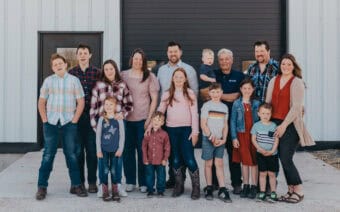October 6, 2022
OGDENSBURG – The Drath family has been farming land in Ogdensburg for more than 80 years.
“My late grandparents Bill and Irene Drath bought this farm in 1940,” Keary Drath said.
Keary, a 1982 Manawa High School graduate, said in that time frame, the operation has not only grown but transformed significantly – eventually transitioning from a dairy operation to a 100% full-blood, black Wagyu beef operation.
“I was raised on this farm,” he said. “It was a normal farm – we were milking about 40 cows.”
However, Keary said milking cows wasn’t necessarily something he wanted to do his whole life, and eventually looked at other ways to farm the family land.
“I had to find something different, so I started growing ginseng in 1990,” he said. “I’m a mid-size grower and a broker for the ginseng industry. It takes three to four years to grow the product, but ginseng is the bill-payer – it’s about 75% of our business.”
Drath co-owns Drath Family Farm with his brother, Nathan, and co-owns Drath Family Ginseng with his wife Laura.
Keary said his sons – Connor, an elementary school teacher, and Parker, an accounting major at the University of Wisconsin-Stevens Point – also pitch in on the farm and own some of the cattle there as well.
Wagyu beef
Though the ginseng side of the business helps foot the bill, Keary said full-blood, black Wagyu cattle is what the Drath Family Farm is mostly known for.
Wagyu is a Japanese beef cattle, and according to Drath Family Farm’s website, they were originally draft animals used in agriculture because of their physical endurance thanks to more intramuscular fat cells — or marbling.?
“About 10 years ago, we bought embryos and a couple of Wagyu cows from other Wagyu producers in the U.S.,” Keary said. “These cattle were bred to work – that’s why you get all the marbling in the muscle. It makes the beef tender. The 100% full-blood Wagyu beef is rich in flavor and the finest quality of beef available in the United States. The cattle’s genetic predisposition yields a beef that contains a higher percentage of Omega-3 and Omega fatty acids than any other typical beef. It’s more like salmon because of that.”
Keary said with the meat’s quality being high, so is its price – with some cuts, such as tenderloin filets, retailing at $95 per pound.
Keary said Drath Family Farm’s Wagyu products can be found at a handful of local establishments, including Vince Lombardi’s Steakhouse in Appleton and Field & Fire in Greenville.
“They do an excellent business,” he said. “We have others in places in Milwaukee, Wausau, Manawa, Rosholt, Waupaca – we’ve got probably a dozen restaurants and a couple of retail outlets.”
However, Keary said most of their business is from individual customers.
“They usually buy a $500 box or a $250 box of beef,” he said. “All are equally tender. It’s remarkably different from any other beef. People will buy this and not blink an eye (at the price), as long as they know what they’re getting.”
More about the farm
Keary said the Drath Family Farm is made up of several hundred acres – which is split between the ginseng operation, pastures where the few hundred cattle can graze in a stress-free environment and hay fields used as supplement feed for the cattle.
He said all the feed given to their cattle is grown and harvested on the farm.
Keary said it takes 30 months for the cattle to mature enough for proper marbling before being butchered, which is done off-site at three different Central Wisconsin companies.
Keary said many don’t realize the cattle at Drath Family Farm are Wagyu.
//s3.amazonaws.com/appforest_uf/f1665088148935x732402877813507200/richtext_content.webp
Keary Drath said though farm life is tough, as a third-generation farmer, it’s in his blood. Amanda Lauer Photo
“They look like black cows,” he said. “The cows are the breeding stock; the steers are what you butcher. The females will go into burger (meat) most likely (when they’re past the breeding stage). The genetics are the same, so the quality is the same.”
Keary said farming is not an easy job by any means, and it can sometimes be a struggle to make ends meet, particularly in this day and age.
However, regardless of the hours and workload, Keary said farming is part of his DNA.
“I’ve been handling cattle my whole life,” he said. “I think, it’s in your blood almost. My job starts at 4:30 in the morning – I check on my parents, check on the dog, I go out and count the calves. I check them two or three times a day to make sure everybody’s doing what they’re supposed to be doing.”
Keary said each day on the farm brings new challenges, especially when it comes to Mother Nature.
“Weather-wise, you never know how much pouring rain you’ll have, and cows are having calves during the rain sometime,” he said.
Raising, and keeping track of, hundreds of cattle Keary said, can also be challenging at times.
“I was up (one) morning looking for a little calf, No. 80,” he said. “He’s a good little calf, but he was missing all day (the previous day) and I knew he was in the woods. I found him about 4:45 (that) morning.”
Over the years, Keary said he’s been able to travel quite a bit, and what it’s shown him is he is content with where he is.
“I don’t want to be a mammoth farmer,” he said. “I don’t want to have 3,000 cows. I don’t want to have hundreds of thousands of acres.”
Keary said he has done public appearances for the ginseng business, which he knows is important, but prefers the comforts of the farm.
“I do things for the ginseng industry – I’ve done radio and TV stuff out in New York and California… I know you need to do it, so I do it and it’s good,” he said. “But I don’t get a kick out of that. I’d never want to live in a big city.”
 Hope Voigt named president/COO of De Pere-headquartered Tweet Garot
Hope Voigt named president/COO of De Pere-headquartered Tweet Garot Popping its way to success in North Central Wisconsin
Popping its way to success in North Central Wisconsin





